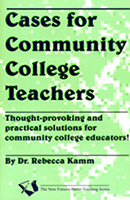Key Information
Cases for Community College Teachers: Thought-Provoking and Practical Solutions for Community College Educators!, By Rebecca Kamm
2001 [ISBN: 0-913507-76-8; 130 pages soft cover, 5.5-by-8.5-inch] $16.95
 Here are thought-provoking and practical solutions for community college educators! This excellent work provides addresses a critical need in two-year institutions by providing information about issues the faculty face regularly. The author, Dr. Rebecca Kamm, uses twenty case studies to illustrate situations involving practical, everyday situations. Cases cover a spectrum of student-teacher-classroom situations, such as: a student’s animosity toward mathematics, a part-time instructor’s conflicts with her supervisor, a teacher’s frustrations with the use of new technology. This book is designed to be used for faculty development, community college student discussion, teacher study groups, pre-service teacher training, and models for case writing. Teachers in any discipline could connect with these cases and use the examples as springboards for discussion and development of further cases. How does a teacher survive her first day of a semester? How do nontraditional students build courage to return to college? How does the student/teacher relationship impact learning? Cases for Community College Teachers addresses these concerns in thought-provoking case studies. This engaging text is a valuable resource for community college educators who seek practical solutions for today’s challenges.
Here are thought-provoking and practical solutions for community college educators! This excellent work provides addresses a critical need in two-year institutions by providing information about issues the faculty face regularly. The author, Dr. Rebecca Kamm, uses twenty case studies to illustrate situations involving practical, everyday situations. Cases cover a spectrum of student-teacher-classroom situations, such as: a student’s animosity toward mathematics, a part-time instructor’s conflicts with her supervisor, a teacher’s frustrations with the use of new technology. This book is designed to be used for faculty development, community college student discussion, teacher study groups, pre-service teacher training, and models for case writing. Teachers in any discipline could connect with these cases and use the examples as springboards for discussion and development of further cases. How does a teacher survive her first day of a semester? How do nontraditional students build courage to return to college? How does the student/teacher relationship impact learning? Cases for Community College Teachers addresses these concerns in thought-provoking case studies. This engaging text is a valuable resource for community college educators who seek practical solutions for today’s challenges.
The Contents
Introduction: General information about using a case study approach is presented. Uses for the case study in this book are described, and the importance of using cases particular to community colleges is discussed.
Case 1: A teacher describes the first class day of the semester.
Case 2: One student’s views about his college composition course and the differing perspectives between the student and the teacher are described.
Case 3: A 42-year-old woman builds enough courage to attend college as a nontraditional student when her son enrolls in college.
Case 4: A teacher describes a class where several students withdraw. One potential dropout returns and successfully completes the course.
Case 5: A part-time instructor experiences difficulty with her part-time status and the way she is treated by her supervisor.
Case 6: A young woman initially does not view herself as a successful student. The student’s perceptions change in a positive direction during the semester as she fully engages herself in each element of the learning process and classroom community.
Case 7: A math teacher new to the community college setting is surprised by the animosity toward mathematics and considers the stereotypes related to her subject area.
Case 8: A teacher works hard to develop a sense of classroom community. Breakthroughs occur as the teacher tries a group activity to engage the students.
Case 9: A student displays much apathy throughout the semester and experiences problems related to lack of focus. Possible consequences that may arise from students’ negative views about themselves as learners are illustrated.
Case 10: Two teachers discuss stereotypes related to community colleges and brainstorm ways to promote their college.
Case 11: A teacher watching her college’s commencement remembers the progress of several of her students.
Case 12: An employer experiences his first visit to a community college and is introduced to its diverse offerings and the perspectives of the community.
Case 13: Students in an art appreciation class begin thinking in new ways about art and its connection to everyday life.
Case 14: A teacher is hurt when her trust in a student is betrayed.
Case 15: An international student unsuccessful at a private, 4-year college finds his niche at a community college. Case 16: A new teacher discusses his training, certification, and teaching load.
Case 17: A teacher is asked to use new technology to teach distance classes.
Case 18: A student petitions the college for a higher grade, which the teacher does not feel is warranted.
Case 19: A teacher who is reprimanded for experimenting with new teaching strategies meets an instructor whose institution encourages innovation.
Case 20: A student experiences connections between theory and application.
The Author
Rebecca Kamm earned her Ed.D. from the University of Northern Iowa and has taught for many years at Northeast Iowa Community College in Calmar, Iowa. As a member of the communications faculty, Kamm teaches courses in composition, speech, technical writing, and journalism. She served as an exchange teacher to Denmark and is a Fulbright scholar. Her honors include an Excellence in the Field of Educational Research and Evaluation competition award from the Iowa Educational Research and Evaluation Association for her dissertation and a Wartburg College Alumni Citation. Kamm is especially interested in ethnographic research using a teacher as researcher approach.
